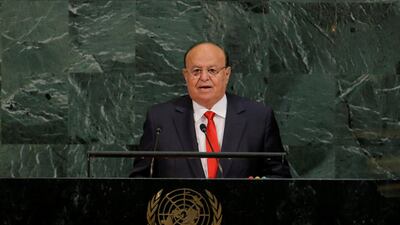Yemeni President Abdrabu Mansur Hadi appointed Mohammed Al Maqdishi on Thursday as minister of defence, according to state news agency Saba.
The post had been vacant for more than three years following the detention of former minister General Mahmoud Al Subaihi in March 2015.
Mr Maqdishi, 56, was born in Yemen's northern Thamar province. He is one of the country's leading military figures and a close aid to the Yemeni Vice President Ali Mohsen Al Ahmar.
In 2007 he was appointed commander of the Ataq military axis and in 2008 of the central military zone, two divisions of the Yemeni army.
Six years later Mr Maqdishi was tasked with leading Yemen's armed forces in the midst of the Houthi uprising in September 2014.
In 2015 President Hadi issued a decree appointing him as chief of staff of the ministry of defence, replacing Major General Hussein Khairan. He was later promoted as adviser to the supreme commander of the armed forces.
In his most recent post, Mr Maqdishi was handed the task of temporarily filling the position of minister of defence while the Houthis continued to hold Mr Al Subaihi under arrest.
_________
Read more:
Coalition strikes at rebel-held air base in Yemeni capital
Yemen government welcomes push for peace talks with rebels
_________
Mr Hadi also appointed Abduallah Al Nakhi as his new chief of staff and Ahmed Salem Rabeea as the new governor of Aden, the agency said.
Mr Rabeea, an engineer, was born in southern Yemen in 1970 before moving to Sanaa with his family. In 1990 he received a scholarship to study aviation engineering in Dallas. He returned to Yemen in 2006 and was appointed as assistant to Aden's governor until 2015 when he became deputy governor.
Mr Rabeea is also the eldest son of prominent politician Salim Rabeea Ali, the late head of state of the People's Democratic Republic of Yemen between 1969 and 1978, when he surrendered and executed by firing squad.
Yemenis expressed divisive reactions to the nominations, with some saying the new appointments are key in helping to stabilise the country's fragile economy and security and others saying they will fuel the rift between the government and those calling for a reshuffling of power in the liberated areas.
The country's civil war, which began when the Iran-backed rebels seized Sanaa, the capital, in September 2014, has left 22 million people — about 75 per cent of the population — in need of assistance, according to the UN.
However the world body has no up-to-date estimate of the death toll in Yemen. It said in August 2016 that according to medical centres at least 10,000 people have been killed.
Saudi Arabia, the UAE and their allies in the Arab Coalition intervened in the conflict at the request of Mr Hadi's government in March 2015.
The Arab coalition has called for the complete withdrawal of the Houthis from Hodeidah, one of Yemen's largest ports. The rebels have offered to hand the operation of the port facility – a vital lifeline for coalition and international aid to reach millions living under the Iran-backed group – to the UN, but under their supervision.

